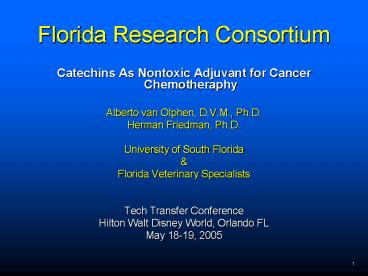Florida Research Consortium - PowerPoint PPT Presentation
1 / 14
Title:
Florida Research Consortium
Description:
Canine Cancer Model. Doxorubicin EGCg. Doxorubicin placebo. Time to cancer remission ... Establishment of dosage in the canine model. Intellectual Property Status ... – PowerPoint PPT presentation
Number of Views:24
Avg rating:3.0/5.0
Title: Florida Research Consortium
1
Florida Research Consortium
- Catechins As Nontoxic Adjuvant for Cancer
Chemotheraphy - Alberto van Olphen, D.V.M., Ph.D.
- Herman Friedman, Ph.D.
- University of South Florida
- Florida Veterinary Specialists
- Tech Transfer Conference
- Hilton Walt Disney World, Orlando FL
- May 18-19, 2005
2
Technology Advantages
- Current cancer chemotherapy causes Neutropenia
(reduction in the number of neutrophils) - Chemotherapeutic agents such as doxorubicin are
antimetabolites that destroy cancer cells, but
also other normal cells - Chemotherapy is often suspended in neutropenic
patients and this may lead to failure of the
cancer treatment - Neutropenic patients are at high risk of
contracting opportunistic microbial infections
3
The Technology
- The proposed technology involves the use of green
tea derivatives (catechins) to aid in the
prevention of microbial infections in patients
receiving chemotherapy for cancer - The major green tea catechin (also known as
polyphenols) is EpiGallo Catechin gallate known
as EGCg - EGCg has been shown by our group and others to
enhance immune response to microbial infection
4
A powerful and practical model
- We propose to use pet dogs undergoing cancer
chemotherapy as a real-life model - Pets share the same environment than humans
- Pets in general and dogs in particular represent
a large market in itself - Alternative medicines are easily adopted by pet
owners - Results obtained with this model are a stepping
stone for human applications
5
Canine Cancer Model
Expected effect of EGCg on cancer patients
Doxorubicin EGCg
Doxorubicin placebo
- Time to cancer remission
- Time to appearance of signs of infection
- Time to cancer recurrence
6
Technology Advantages
- Current therapy includes
- Stimulants of neutrophils production (Granulocyte
Macrophage-Colony Stimulating Factor, GM-CSF and
G-CSF) - Prophylactic and therapeutic antibiotics
- Extremely expensive
- Side effects / Not well tolerated
- EGCg as adjuvant therapy
- Non-toxic
- Relatively inexpensive
- Acts differently than current therapy by
stimulating the patients immune response
7
Scientific Team at USFDepartment of Medical
Microbiology and Immunology
- Alberto van Olphen
- More than 10 years performing basic and clinical
research - Assistant Professor
- D.V.M. UNICEN
- Ph.D. Purdue University
- Dr. Herman Friedman
- More than 40 years directing research in
immunology and microbiology - Distinguished Professor
- More than 250 peer review publications
- Numerous awards
8
Scientific Team at
- Dr. Carrie Kosarek, D.V.M
- Board certified veterinary oncologist
- Extensive experience in clinical trials
- Dr. Neil Shaw, D.V.M.
- Director/owner of Florida Veterinary Specialists
and Cancer Treatment Center
9
- More than 35 veterinarians and more than 90
technicians - More than 25,000 patients a year
- 5-25 cancer patients treatments per day
- State of the art facilities
10
Target Industries
- Biomedical pharmaceutical company
- Tremendous need of palliative inexpensive
therapies - Nutraceutical market
11
Potential Commercial Impact
- Who needs this technology?
- Patients undergoing cancer treatment with
anti-metabolites - What products can be made with this technology?
- Specific formulations/combinations would provide
proprietary rights
12
Technology Status
- Basic research
- Catechins, in a dose related manner, stimulate
host immune responses, - Cytokines and immune cells such as T cells,
macrophages and dendritic cells. - We are analyzing the mechanism how catechins
stimulate immune parameters during chemotherapy
induced immunesuppression (adriamycin). - Establishment of dosage in the canine model.
- Intellectual Property Status
- Institutional disclosure
13
What is Next?
- New formulation/combinations
- Multicenter testing
- Funds needed to complete next phase
- 150,000
14
Point of Contact
- For more information contact
- Alberto van Olphen at avanolph_at_hsc.usf.edu
- Herman Friedman at hfriedma_at_hsc.usf.edu
- (813) 974-2992































